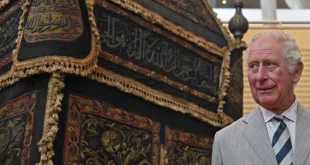Six-month programme aims to increase diversity and follows calls for greater involvement

Muslim women praying in Regents Park Mosque to celebrate the last day of the holy month of Ramadan. Photograph: Alamy Stock Photo
Britain’s leading Muslim organisation has launched a scheme to train women for leadership positions in mosques and community bodies.
Twenty women have embarked on the six-month intensive programme run by the Muslim Council of Britain, aimed at equipping them for leadership positions. As well as one-to-one mentoring, the women will visit “best-practice mosques” and be given media and public speaking training.
A national conference in Manchester this weekend on the future of mosques, organised by the MCB, will include a session on the participation of women on boards of trustees and other bodies running places of worship and community programmes.
The Upside – sign up for our weekly email
Read more
Few mosques in the UK have women on their trustee or management boards, and men outnumber women on all charity trustee boards by two to one, according to the Charity Commission.
The MCB said: “This lack of diversity is unacceptable and it is essential for the management boards of mosques and third sector organisations in general to reflect the communities that they serve in order to function effectively.”
The initiative comes as some Muslim women are demanding equal access to and greater involvement in running mosques. More than a quarter of mosques in the UK have no facilities for women, and in the remainder access is often restricted and the space they are allocated is limited.
In August, Scottish Muslim women launched a campaign for equal prayer space and inclusion in decision-making bodies.
The Scottish Mosques for All campaign said: “It is unfortunate that many mosques fail to provide basic access for Muslim women to use the facility to pray, or the quality of the space can often be inadequate and not suitable.
“It is also unfortunate that many mosques have limited or no women present at mosque trustee or managerial level, either intentionally preventing women from taking up these roles or not sufficiently providing a welcoming atmosphere where women feel comfortable to get involved. The place and role of women in mosques is in real crisis in the UK and elsewhere, and this status quo must change.”
Another organisation, Open My Mosque, is calling for a commitment from mosques to equality, and the Bradford-based Muslim Women’s Council is raising funds for a mosque led and governed by women, “based on the principles of openness, inclusivity, social justice and sanctuary”.
Andleen Razzaq, a former trustee of Al Manaar mosque in west London, who is lead facilitator of the MCB’s women in mosques development programme, said: “Muslim women are doing amazing work in the community, but often have no experience of being trustees or on decision-making bodies. We need to have big conversations around the barriers to women. Most are cultural; in Islam, men and women have equal spiritual standing.
“We can see the direction things are moving in. Women are feeling more empowered – their voices cannot be ignored, the momentum is definitely there. Young women in particular are hungry for change. If men won’t welcome them, women will be tempted to create their own spaces.”
All mosques should “reflect the values of equality, inclusivity and diversity”, she added.
Ghazalla Hussain, who is taking part in the programme, said it was helping her build her confidence and “believe in myself a bit more”. “A lot of mosque committees don’t understand what women want or need. But I think they know times are changing, and they have to change too,” she said.
In a speech on International Women’s Day in March, Harun Khan, the MCB’s secretary general, backed calls for gender equality. It was “time to ensure that everyone understands their own responsibility in achieving equal access and opportunities for men and women in British society today”, he said.
Referring to domestic violence, pay inequality, abuse and harassment, he said: “Closer to home, why is Muslim civil society still full of many mosques that only have prayer spaces for men and none for women, as if to imply that prayer and a sense of community is only for men?”
The marginalisation of women in mosques was “simply unacceptable”, Khan added.
The MCB’s training programme for women will be reviewed at the end of the current pilot scheme, and there are plans to offer a similar programme to men in the future.
This article is part of a series on possible solutions to some of the world’s most stubborn problems. What else should we cover? Email us at [email protected]
Post Disclaimer | Support Us
Support Us
The sailanmuslim.com web site entirely supported by individual donors and well wishers. If you regularly visit this site and wish to show your appreciation, or if you wish to see further development of sailanmuslim.com, please donate us
IMPORTANT : All content hosted on sailanmuslim.com is solely for non-commercial purposes and with the permission of original copyright holders. Any other use of the hosted content, such as for financial gain, requires express approval from the copyright owners.
 Sri lanka Muslims Web Portal Sri Lanka Muslims News Center
Sri lanka Muslims Web Portal Sri Lanka Muslims News Center
 Donate
Donate


